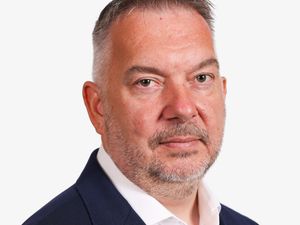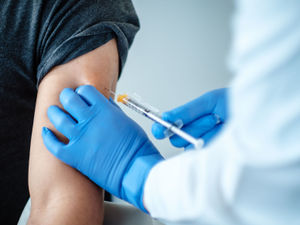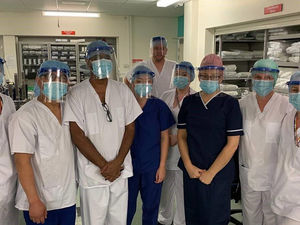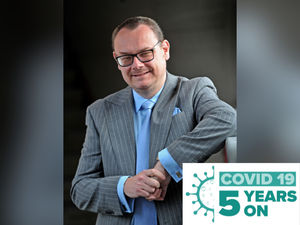Inside ITU: The NHS heroes fighting coronavirus as second wave strikes Shropshire
Hospitals in Shropshire are being forced to adapt to the escalating coronavirus crisis. We find out what it's like on the front line.
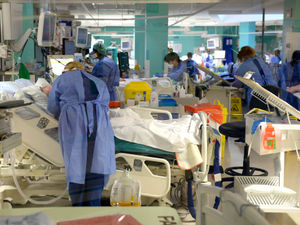
Rows of critically ill patients fight for breath, cared for by medics in the heat of battle.
This is the reality of coronavirus – and those working in our intensive care units want people to understand the enormous pressure they are under.
Hospitals across the region say they are braced for the most critical period of the pandemic, with intensive care patient numbers about to hit peak levels.
They expect demand to soar over the next two to three weeks, on the back of a record number of coronavirus cases in the past fortnight.
Today, those in charge of Shropshire’s two hospitals in Telford and Shrewsbury speak of the intense pressure they are under.
Across the border, Wolverhampton’s New Cross Hospital has allowed the Shropshire Star to capture the quiet heroics of the staff attempting to save lives.
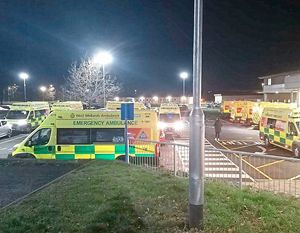
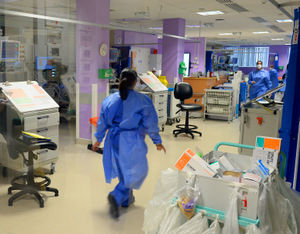
Ten months after the pandemic began the country is in the grip of a third wave of deadly Covid infections – and staff at Shropshire’s hospitals are battling daily to keep sick patients alive.
In a shocking indication of the severity of the situation Royal Shrewsbury Hospital and Princess Royal Hospital in Telford, both managed by Shrewsbury and Telford Hospital NHS Trust, are now treating double the amount of Covid patients they saw during the peak of the first wave.
For exhausted NHS staff, unlike last May, the onset of winter has meant a big increase in patients needing treatment – at accident and emergency and throughout the hospitals – all adding to the strain of the past 10 months.
More than 340 people have now died with coronavirus at Shrewsbury and Telford hospitals since the pandemic began. In a clear sign of how the crisis has escalated, 28 people died with Covid at the two hospitals in the seven days up to Friday.
Heroes on the front line
Dr Elin Roddy, a consultant respiratory physician at the trust, today said the impact of the latest increase in cases across the county had been evident on the wards at both hospitals.
Dr Roddy, a 48-year-old mother of three, has spoken about the effect of the pandemic on patients, their families.
And she spoke of the mental toll the crisis has had on NHS staff, and the reality of an illness that sees two wards full of people requiring breathing equipment at each hospital.
She said: “Generally the hospitals have almost twice as many Covid patients as at the peak in May last year.
“Also in May we saw a big drop in other attendances so we had a lot of capacity but this year, because it is winter there has not been a drop off in the non-Covid admissions so we are very pressured.
“We have not run out of capacity but there are situations where ambulances are waiting to offload outside A&E – you may have seen pictures on social media – because there is not space. That is because we are working very hard to move patients from A&E to make the space."
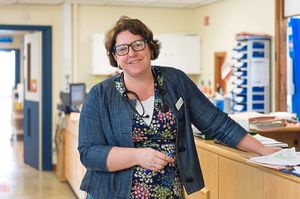
She added: “Winter is always hard but this is something else.
“We were not the hardest hit in the first wave. There were other hospitals in other parts of the country that took more patients but I think all around the country there are more patients than there were during the first wave, and with the new variant around we have seen it spread more quickly.
“We have had situations where people have only been in contact with someone for an hour and it runs through a whole family and several members are admitted to hospital.”
Dr Roddy said that the nature of the illness had created huge difficulties for patients, particularly those who are dying and may have to say their final farewells using Facetime.
She said there could also be long term impacts on staff, despite concerted efforts from the trust to ensure support is available.
More Covid-19 coverage:
She said: “People are exhausted. I think it has been so long. When you talked about a major incident in the NHS previously you were talking about something that lasted a week and then you deal with the aftermath, this has been 10 months now so people are exhausted.
“People are dealing with the most distressing situations – people dying essentially – and having to see people say goodbye on Facetime and that takes its toll.
“We have a lot of staff support in place but even with that it is very difficult. We are letting people come in when someone is at the end of life, even with Covid and they have to wear all the correct PPE. But we still cannot let people in who have a Covid infection and that can be very difficult. If you are a married couple and you have sent someone off in an ambulance that could be the last time you see that person and for staff to see that is incredibly hard – they are not in isolation, they are mums, brothers, sisters, and they are all managing all these issues as well.”

Dr Roddy said there had been positives amid the strains, with improvements in the way the hospital operates, great developments from research studies leading to better treatment, an appreciation of the team effort across the trust, and the phenomenal efforts of nurses and healthcare assistants.
She said: “As a hospital we have become a lot more agile, we get things sorted a lot more quickly and I think there is a huge appreciation for bits of the hospital we might not have seen before, like cleanliness technicians and lab staff.”
She added: “I think nursing and health care assistant colleagues in this have been absolutely incredible. We go to a ward do our round, talk to the patients and spend a lot of time there, but they are there 12 hours a stretch, whether that’s the respiratory ward or intensive care, and I hope the public have increased appreciation for what they do. It has been a massive team effort and that is what it has brought home to me.”
The long term impacts of the Covid – not just directly on those who have had it – are likely to be felt for years to come, and Dr Roddy said she worried that the strain could lead to some staff leaving the NHS. She said: “I think there are three main long term concerns.
“Patients who have had Covid who will go on to develop long term complications – not just Long Covid. That will happen.
“The second thing is capacity issues for the NHS. The NHS has had an awful lot of things on hold to deal with Covid and they wont go away.
“All of our staff in respiratory, with my surgical colleagues, there is a huge amount of catch up.
“The third is mental health. People will leave the NHS because of how things were during Covid and that will make it very difficult.
“We were short of staff before Covid. Every winter we say we don’t know if we can do it again but this has just magnified it.”
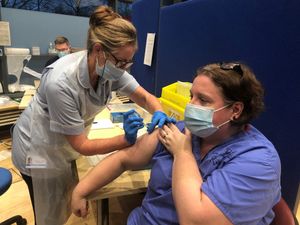
Recent weeks have also seen an increase in people touting conspiracy theories, claiming Covid is ‘no worse than flu’, and even sneaking into hospitals to film empty corridors for what they claim is evidence that they are not in fact busy.
It frustrates all those working to keep people alive, including Wolverhampton’s New Cross Hospital, which has doubled its ITU capacity and has allowed images of its unit to be used by the Shropshire Star in order for the reality of the situation to hit home.
For the majority of the population the claims are dismissed as ludicrous, but for those health workers seeing people dying every day from Covid it has to be doubly insulting.
Dr Roddy said that type of behaviour was frustrating, and that she had made a concious choice to ignore the Covid deniers. She said: “I do not understand their motive. It used to make me angry but I think that is a wasted emotion so my feeling now is these people do not deserve my energy. My energy is limited and needs to be focussed on looking after patients and my family so I try and ignore it.
“That does become different though when it is people encouraging other people to behave badly – to not have the vaccination or to break lockdown.”
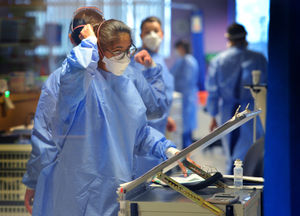
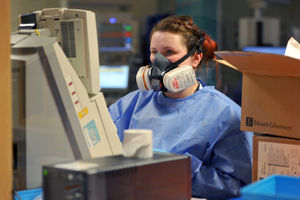
Specifically on those filming in hospitals she said: “It is incredibly frustrating. You see someone has filmed an empty corridor – of course it is empty, it is somewhere we do not treat patients.”
She also urged people to be in no doubt that Covid “is so much more than flu.” She said: “I can see why people would like to think it is the flu – but the reality is it is much worse, far more deadly.
“We have a ward on each site full of people on breathing equipment. Those wards did not exist at this time last year. Those people will not feel better in a few days. It will be weeks or months. About a quarter will die and that is a big number.”
Across the Midlands hospitals are seeing rising admissions. Dr Brian McKaig, deputy medical director at New Cross, stressed the importance of the stay at home message – and urged people to take the vaccine when it is available.
“The vaccine is our way of getting out of the pandemic,” he said.
“If you want to protect yourself and those around you, you should take the opportunity when it comes.”

